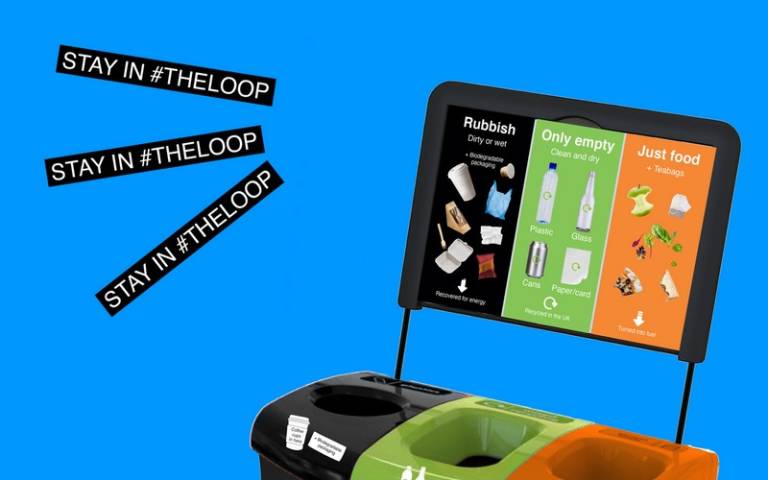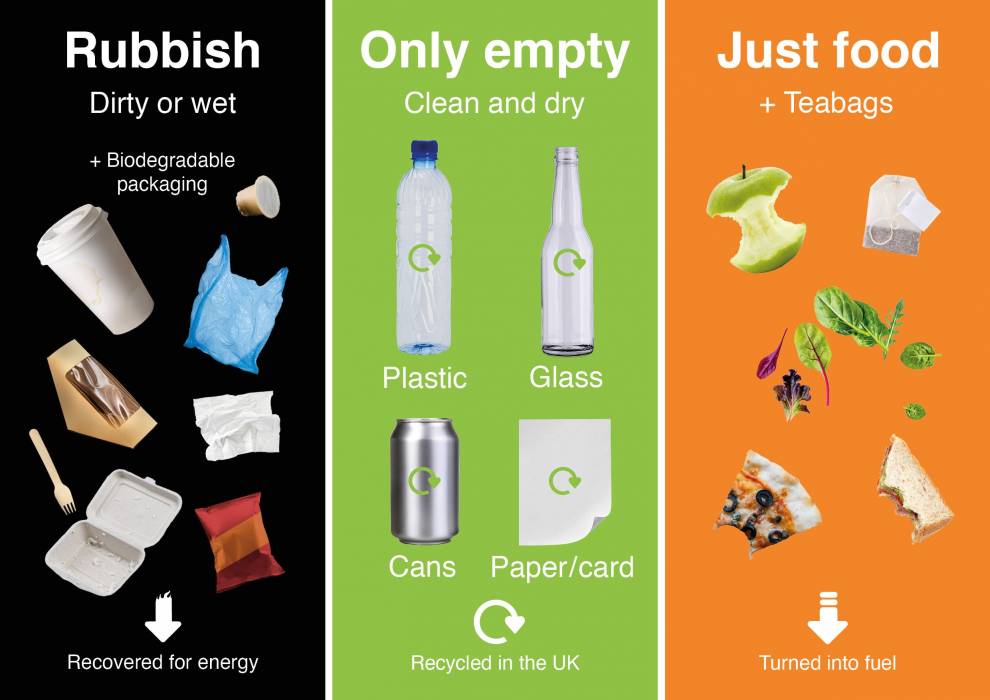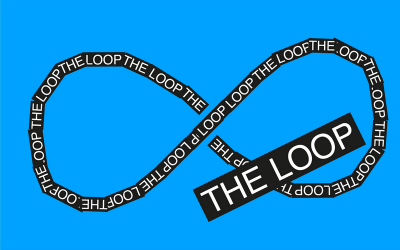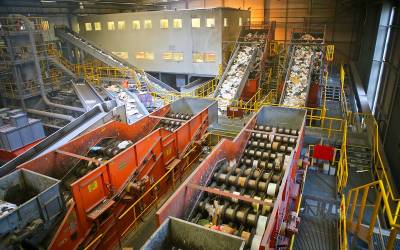Check before you chuck
Let’s make the most out of our recycling at UCL. Our goal is to recycle 85% of our waste, that's 1,811 tonnes of material or 151 double buses!

13 November 2023
The recycling system can only cope with a small amount of contamination (wrong materials, food or liquid). We want to make sure we’re recycling the good stuff: clean and dry paper, cans and plastic bottles! If in doubt, use the black rubbish bin. Food waste and organic material is sent to anaerobic digestion for fuel; our recycling is sorted and handled in Kent and what’s left and can’t be recycled is recovered for energy in Avonmouth.

Dirty and Wet Rubbish
This bin is for non-recyclable items like the scruchable plastics that make crisp packets and chocolate wrappers. Dirty or wet food packaging and biodegradable packaging goes in here too. These materials are incinerated and the heat they produce is used to generate energy.
Use these bins for:
- Packaging contaminated with food or liquid;
- Coffee cups, including biodegradable and compostable ones;
- PPE such as masks or gloves;
- Chewing gum;
- Polystyrene;
- Soft or scrunchy plastics like crisp packets, chocolate wrappers, plastic bags and cling film;
- Compostable or biodegradable plates and cutlery;
- Used and dirty tissues and hand towels.
> Visit Suez to see if your waste gets turned into energy waste.
Only empty, clean and dry Recycling
This bin is for all dry, empty, food-free, recyclable material. These materials are sorted in a facility in Kent to ensure that the highest possible amount of recyclable material is retained.
Use these bins for:
- Paper;
- Cardboard, including coffee cup sleeves and sandwich boxes with the plastic separated;
- Drinks cans;
- Plastic drinks bottles;
- Cartons, like tetrapack;
- Glass;
- Clean plastic containers;
- If you are unsure, or the item is dirty, please use the black rubbish bin to avoid contamination.
> Visit Suez to see how your waste is recycled.
Just Food
This bin is for all food products and things like teabags and coffee grounds. These materials are taken off-site and broken down using anaerobic digestion which turns it into fuel.
Use these bins for:
- Tea bags and coffee grounds;
- Fruit and vegetables;
- Meat and fish;
- Bread;
- Dairy products;
- Rice, pasta and beans;
- Eggs and eggshells.
> Visit Suez to learn more about anaerobic digestion.
Labs
In labs, you may also put the following clean items in our recycling bins. We ask that you remove any labels from items being recycled:
- Tip boxes (or use a manufacturer’s collection scheme);
- Packaging (e.g. separated sleeves, bags and wraps from sterile consumables, clean bottles);
- Hand towels;
- Paper/cardboard.
Recycling Difficult Items
Although most of the waste we generate will fit into one of UCL's three main waste streams, some waste may be hazardous, require specialist recycling, or may be unwanted but still usable.
Electrical and Electronic Equipment
This includes (but is not limited to) computer monitors, televisions, fridges, freezers and refrigeration equipment. Normally there will be a charge for the disposal of these items.
> View UCL Estates list of chargeable wastes and the costs of disposal.
> Visit UCL Estates to find out more about disposing of electronic and electrical equipment.
IT Equipment
> Download our Recycling and Disposal of IT Equipment fact sheet (pdf).
Batteries
Batteries should be disposed of in separate battery recycling bins which are located around the estate. Your building will likely have a battery recycling point. If it doesn't, you can request one from Facilities Services.
> Visit UCL Estates to find out more about battery recycling.
Toner and print cartridges
Toner and print cartridges should be recycled in dedicated bins. If your building doesn't already have a bin provided for toner and ink cartridge recycling, you can order one on request.
> Visit UCL Estates to find out more about toner and print cartridge recycling.
Hazardous waste
There are a variety of different processes and procedures in place to ensure the safe disposal of hazardous wastes.
> Visit UCL Estates to find out more about disposing of hazardous waste or contact Facilities Services via the Customer Service Centre for more advice.
 Close
Close



